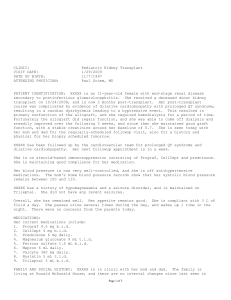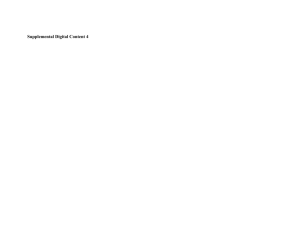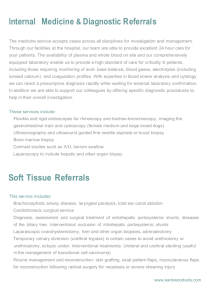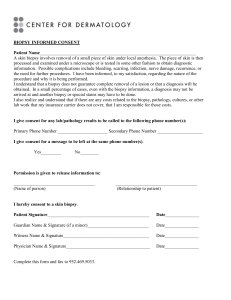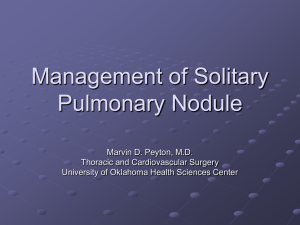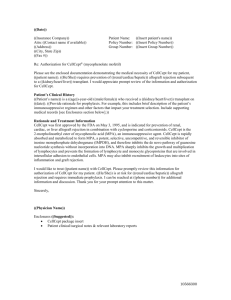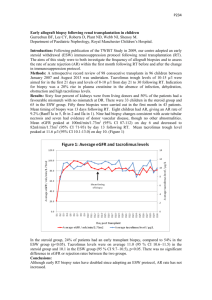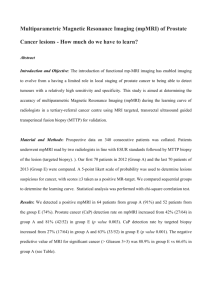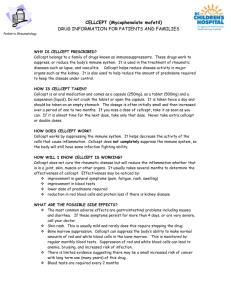CLINIC: - Acusis
advertisement
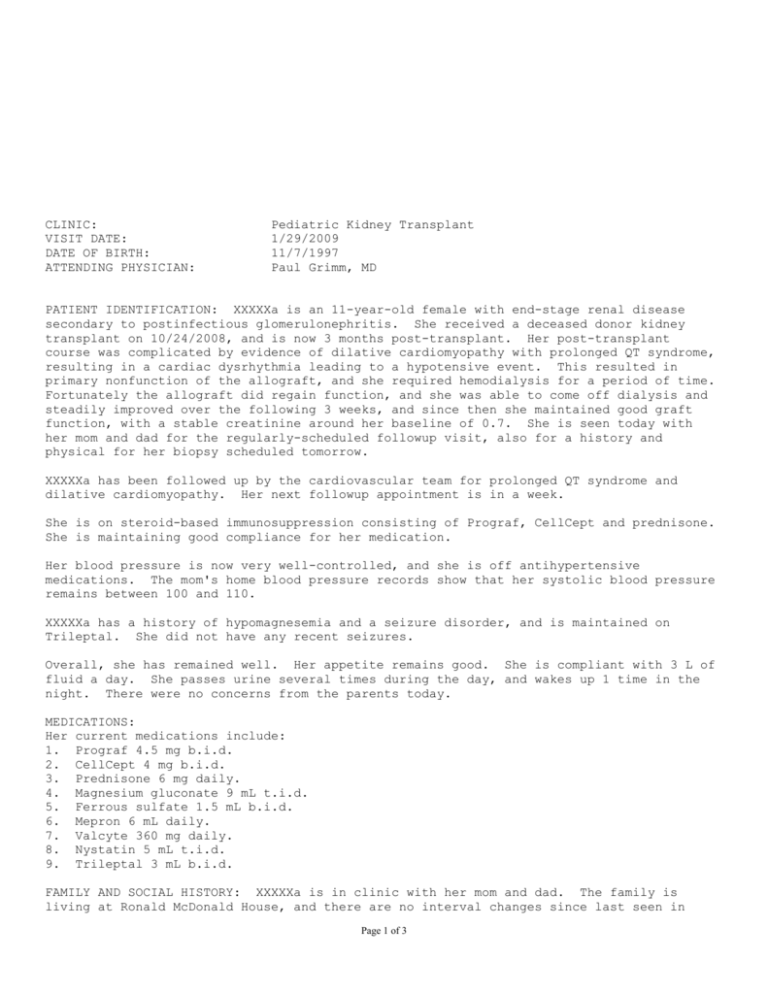
CLINIC: VISIT DATE: DATE OF BIRTH: ATTENDING PHYSICIAN: Pediatric Kidney Transplant 1/29/2009 11/7/1997 Paul Grimm, MD PATIENT IDENTIFICATION: XXXXXa is an 11-year-old female with end-stage renal disease secondary to postinfectious glomerulonephritis. She received a deceased donor kidney transplant on 10/24/2008, and is now 3 months post-transplant. Her post-transplant course was complicated by evidence of dilative cardiomyopathy with prolonged QT syndrome, resulting in a cardiac dysrhythmia leading to a hypotensive event. This resulted in primary nonfunction of the allograft, and she required hemodialysis for a period of time. Fortunately the allograft did regain function, and she was able to come off dialysis and steadily improved over the following 3 weeks, and since then she maintained good graft function, with a stable creatinine around her baseline of 0.7. She is seen today with her mom and dad for the regularly-scheduled followup visit, also for a history and physical for her biopsy scheduled tomorrow. XXXXXa has been followed up by the cardiovascular team for prolonged QT syndrome and dilative cardiomyopathy. Her next followup appointment is in a week. She is on steroid-based immunosuppression consisting of Prograf, CellCept and prednisone. She is maintaining good compliance for her medication. Her blood pressure is now very well-controlled, and she is off antihypertensive medications. The mom's home blood pressure records show that her systolic blood pressure remains between 100 and 110. XXXXXa has a history of hypomagnesemia and a seizure disorder, and is maintained on Trileptal. She did not have any recent seizures. Overall, she has remained well. Her appetite remains good. She is compliant with 3 L of fluid a day. She passes urine several times during the day, and wakes up 1 time in the night. There were no concerns from the parents today. MEDICATIONS: Her current medications include: 1. Prograf 4.5 mg b.i.d. 2. CellCept 4 mg b.i.d. 3. Prednisone 6 mg daily. 4. Magnesium gluconate 9 mL t.i.d. 5. Ferrous sulfate 1.5 mL b.i.d. 6. Mepron 6 mL daily. 7. Valcyte 360 mg daily. 8. Nystatin 5 mL t.i.d. 9. Trileptal 3 mL b.i.d. FAMILY AND SOCIAL HISTORY: XXXXXa is in clinic with her mom and dad. The family is living at Ronald McDonald House, and there are no interval changes since last seen in Page 1 of 3 clinic on 1/5/2009. PHYSICAL EXAMINATION: XXXXXa is in excellent spirits today. VITAL SIGNS: Weight 33.4 kg. Height 133.9 cm. Blood pressure 107/73 mmHg. Pulse 87. Afebrile. HEENT: Normocephalic and atraumatic. Tympanic membranes are clear. Oropharynx is clear. Pupils are equal and reactive to light. Conjunctivae are clear and noninjected. Sclerae are nonicteric. Mucous membranes are moist. NECK: Supple, with no lymphadenopathy. LUNGS: Clear to auscultation. CARDIAC: Normal, with regular rate and rhythm. No murmur. ABDOMEN: Soft, nondistended and nontender. Bowel sounds are present. No abdominal masses. Her renal allograft is palpable in the right lower quadrant, which is nontender. No bruit heard. SKIN: Negative for rash. NEUROLOGIC: Grossly intact. REVIEW OF SYSTEMS: Today's review of systems was largely negative. She denied any change in weight, any fever, any upper respiratory or GI symptoms. She does not have any diarrhea or constipation. No skin rash. She does not complain of headaches, dizziness, bruising, joint pain or swelling, anxiety or depression. All other review of systems is also negative. ALLERGIES: AMOXICILLIN AND IBUPROFEN. LABORATORY VALUES: Her most recent laboratory values are from 1/26/2009, showing a white cell count of 6.9, hemoglobin 13, platelets 292, sodium 141, potassium 4.5, chloride 108, CO2 22, glucose 88, calcium 9.4, phosphorus 4.9, uric acid 4.6, magnesium 1.6, BUN 20 and creatinine 0.63. Her Prograf and CellCept levels are pending from that day. ASSESSMENT AND PLAN: XXXXXa is an 11-year-old girl who is now 3 months status post deceased donor kidney transplant performed on 10/25/2008. Her post-transplant course was complicated with dilative cardiomyopathy and prolonged QT syndrome, leading to dysrhythmia and hypotensive event, resulting in primary nonfunction of the kidney, resulting in hemodialysis-dependence until allograft function recovered. Currently she is doing well, with creatinine stable around baseline at 0.7. 1. RENAL BIOPSY: XXXXXa is scheduled for her 3-month post-transplant protocol biopsy. In preparation for the biopsy, we discussed the risks of the biopsy with her family, including bleeding, infection, hematoma formation, and __________ for possible formation of __________ and gross hematuria following the biopsy. The parents asked appropriate questions, and signed the consent for the procedure. Her physical examination is unremarkable, and she is definitely fit to undergo the biopsy. Her anesthesia, however, should be geared towards her underlying cardiac problem, and she will require a cardiac anesthesia. She will also require coagulation studies to check her INR, which will be done today after this clinic. 2. RENAL TRANSPLANT: XXXXXa continues to do well after a stormy initial post-transplant course. Her most recent creatinine is 0.63. Her immunosuppression is Prograf, CellCept Page 2 of 3 and steroids, and the levels are within target, and we are making necessary adjustments to the dose according to the level, to keep the Prograf goal level between 5-7 and CellCept within 2-4. 3. BLOOD PRESSURE: Her blood pressures remain under control. pressure medication. 4. CARDIOLOGY: week's time. She is on no blood XXXXXa is followed by the cardiac team, and is due to be seen in a 5. INFECTIOUS COMPLICATIONS: XXXXXa had CBV detected in her blood, but at less than 2000 copies, on 12/29. Her CMV PCR was negative. Her BK was less than 500 copies. On account of this, we have decided to continue her on the Valcyte. She is having Mepron (atovaquone) for her primary prophylaxis. She is not on Bactrim because of her underlying prolonged QT syndrome; however, the mom did end up giving her Bactrim since discharge up until a week back, and has now run out of the medication. We have explained to her that XXXXXa does not need to be on Bactrim anymore. 6. FOLLOWUP: We will follow her up in 2 weeks' time after her biopsy to discuss the results and to see how she is doing overall. Page 3 of 3
